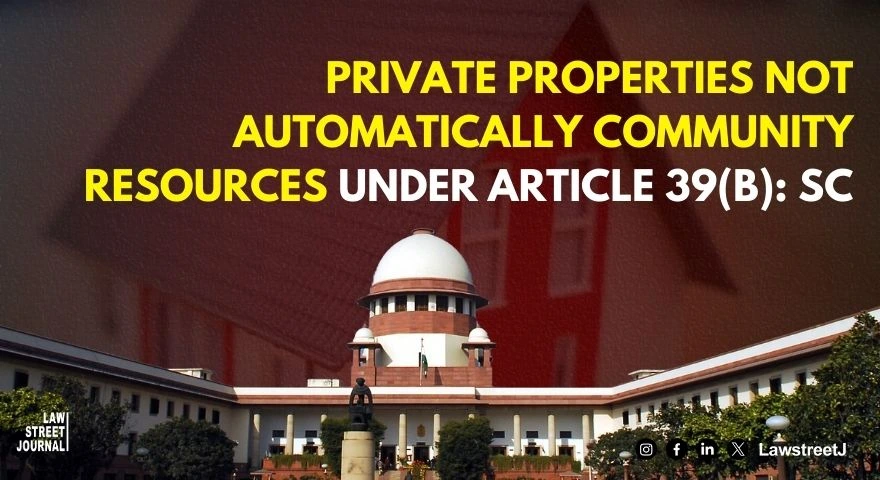NEW DELHI: The Supreme Court on Tuesday held that all privately owned properties can not be termed as material resources of the community.
It, however, said the State can stake claims over resources that are material and are held by the community, for public good.
A nine-judge Constitution bench led by Chief Justice of India D Y Chandrachud by a majority view held that Justice V Krishna Iyer's previous decision which declared that all privately owned resources can be acquired by the State, was motivated by a particular economic and socialist ideology.
SC Rules: Privately Owned Properties Not Automatically Community Resources under Article 39(b)
"There is a distinction between holding that private property may form part of the wealth of the community's material resources and it is wholly part of the community's wealth," the bench said.
The majority judgment was authored by the CJI Chandrachud, for himself and Justices Hrishikesh Roy, J B Pardiwala, Manoj Misra, Rajesh Bindal, Satish Chandra Sharma and Augustine George Masih.
The CJI, reading out excerpts, held that it is incorrect to hold that all private properties would belong to community resources.
He noted the previous ruling by Justice Iyer was rooted in particular economic ideology.
Supreme Court Verdict: State Can’t Treat All Private Property as Public Resources for Redistribution
The CJI said the role of this court was not to lay down economic policy. He noted people have voted for the government, which adopted varied economic policy.
It would undermine the very principle of the Constitution if all resources held by the individuals are considered as material resources of the community.
"Not every resource owned by individual can be considered as material resource of the community," he said.
The court did not with previous judgments, which were based on socialist theme and had held that to develop an egalitarian society, government can direct its policies to redistribute community's material resources, including privately owned properties, to subserve common good.
The majority judgment held Justice Iyer's 1978 ruling that all properties of private individuals can be termed community property, advanced only the socialist economic ideology, which was unsustainable.
However, it said some private property could be termed as community property.
The court noted there has been a shift towards socialist economy in 1960s and 70s, but the focus shifted to market oriented economy since 1990s.
It said the country's trajectory of economy eschewed any particular type of economy but meant to meet emerging challenges of a developing country.
The court pointed out adoption of dynamic economic policy through the last 30-odd years has made India the fastest growing economy in the world.
The majority view held it cannot subscribe to Justice Iyer's philosophy that every asset, including that of private individuals, can be termed community resource.
The other judges in the bench Justices B V Nagarathna and Sudhanshu Dhulia partially differed with the CJI's majority judgment.
The question before the bench was whether privately owned property are covered under the ambit of “material resources of the community”, under Article 39(b) of the Constitution.
Article 39(b) enjoined the State to endeavor “that the ownership and control of material resources of the community, are so distributed as best to subserve the common good”.
The issue also involves interpretation of Article 39(c) which says “the operation of the economic system does not result in the concentration of wealth and means of production to the common detriment”.
The case emanated from a law in Maharashtra that allows a state undertaking (MHADA – Maharashtra Housing and Development Authority) to acquire certain private properties under Chapter VIII-A of the MHADA Act 1976. The acquisition of the private properties could be for better preservation of the said property/building or for reconstruction/repairs etc.
The petitioners led by Property Owners Association argued that “material resources” of a community does not include private resources and Article 39(b) talks only of public resources or national resources as only these resources can be redistributed by the State to subserve the greatest common good.
The Union government and MHADA, on the other hand, argued against a restrictive interpretation of Article 39(b).
They contended that the principle of ‘common good’ and the ideals of the Constitution, which is to ensure ‘distributive justice’ and achieve socialist egalitarian goals of distribution of resources would stand defeated if privately held properties are kept outside the ambit of Article 39(b).















